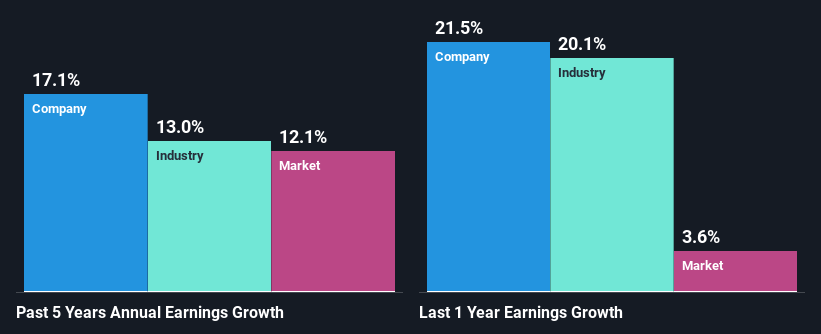Is Quanta Services, Inc.'s (NYSE:PWR) Recent Stock Performance Tethered To Its Strong Fundamentals?
Most readers would already be aware that Quanta Services' (NYSE:PWR) stock increased significantly by 14% over the past month. Given the company's impressive performance, we decided to study its financial indicators more closely as a company's financial health over the long-term usually dictates market outcomes. Particularly, we will be paying attention to Quanta Services' ROE today.
Return on equity or ROE is an important factor to be considered by a shareholder because it tells them how effectively their capital is being reinvested. In short, ROE shows the profit each dollar generates with respect to its shareholder investments.
How Is ROE Calculated?
The formula for return on equity is:
Return on Equity = Net Profit (from continuing operations) ÷ Shareholders' Equity
So, based on the above formula, the ROE for Quanta Services is:
13% = US$927m ÷ US$7.3b (Based on the trailing twelve months to December 2024).
The 'return' is the profit over the last twelve months. So, this means that for every $1 of its shareholder's investments, the company generates a profit of $0.13.
See our latest analysis for Quanta Services
What Is The Relationship Between ROE And Earnings Growth?
So far, we've learned that ROE is a measure of a company's profitability. Depending on how much of these profits the company reinvests or "retains", and how effectively it does so, we are then able to assess a company’s earnings growth potential. Generally speaking, other things being equal, firms with a high return on equity and profit retention, have a higher growth rate than firms that don’t share these attributes.
Quanta Services' Earnings Growth And 13% ROE
At first glance, Quanta Services seems to have a decent ROE. Even so, when compared with the average industry ROE of 19%, we aren't very excited. However, the moderate 17% net income growth seen by Quanta Services over the past five years is definitely a positive. So, there might be other aspects that are positively influencing earnings growth. For example, it is possible that the company's management has made some good strategic decisions, or that the company has a low payout ratio. However, not to forget, the company does have a decent ROE to begin with, just that it is lower than the industry average. So this also provides some context to the earnings growth seen by the company.
Next, on comparing with the industry net income growth, we found that Quanta Services' growth is quite high when compared to the industry average growth of 13% in the same period, which is great to see.

Earnings growth is an important metric to consider when valuing a stock. It’s important for an investor to know whether the market has priced in the company's expected earnings growth (or decline). Doing so will help them establish if the stock's future looks promising or ominous. What is PWR worth today? The intrinsic value infographic in our free research report helps visualize whether PWR is currently mispriced by the market.
Is Quanta Services Using Its Retained Earnings Effectively?
Quanta Services' three-year median payout ratio to shareholders is 7.2% (implying that it retains 93% of its income), which is on the lower side, so it seems like the management is reinvesting profits heavily to grow its business.
Additionally, Quanta Services has paid dividends over a period of six years which means that the company is pretty serious about sharing its profits with shareholders. Upon studying the latest analysts' consensus data, we found that the company's future payout ratio is expected to drop to 3.8% over the next three years. Despite the lower expected payout ratio, the company's ROE is not expected to change by much.
Conclusion
On the whole, we feel that Quanta Services' performance has been quite good. Particularly, we like that the company is reinvesting heavily into its business at a moderate rate of return. Unsurprisingly, this has led to an impressive earnings growth. On studying current analyst estimates, we found that analysts expect the company to continue its recent growth streak. To know more about the latest analysts predictions for the company, check out this visualization of analyst forecasts for the company.
Have feedback on this article? Concerned about the content? Get in touch with us directly. Alternatively, email editorial-team (at) simplywallst.com.
This article by Simply Wall St is general in nature. We provide commentary based on historical data and analyst forecasts only using an unbiased methodology and our articles are not intended to be financial advice. It does not constitute a recommendation to buy or sell any stock, and does not take account of your objectives, or your financial situation. We aim to bring you long-term focused analysis driven by fundamental data. Note that our analysis may not factor in the latest price-sensitive company announcements or qualitative material. Simply Wall St has no position in any stocks mentioned.
 Wall Street Journal
Wall Street Journal